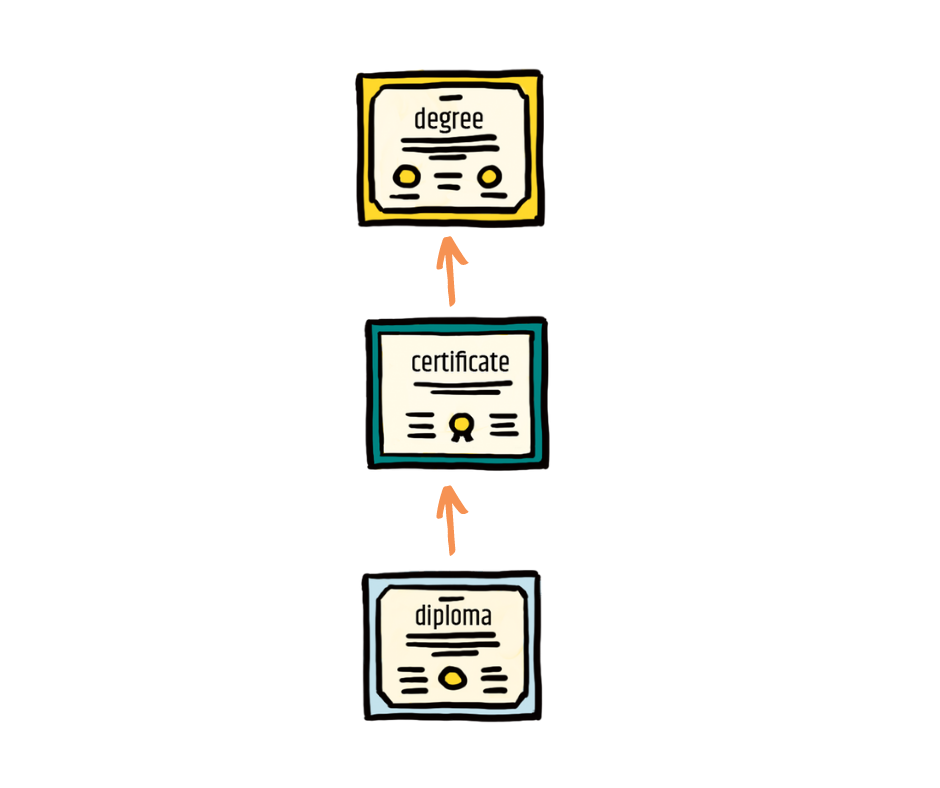JUMP TO: What Is A Credential | Stackable Credentials | Industry Recognized Credentials
Credentials are an important part of your education and career journey. Earning one or more credentials will help you have more job opportunities and make more money. But it is important to pursue the right credential to help you meet your goals.
But First…What Is A Credential?
A credential is a qualification you earn through an education or training program that shows the world that you have a specific set of skills and knowledge.
You usually get a piece of paper, like a diploma, certificate, or degree — that is your physical credential. However, you don’t need to carry around that piece of paper to your job interviews. You can list your credentials on your resume so employers know what types of training you have.

Stackable Credentials
Stackable credentials are kind of like educational building blocks. Each block is useful on its own, but then when stacked together, you can build something even better. The exciting part is that there are endless ways to make the different blocks stack together.
Let’s think about your career. You may have heard that the best type of education after high school is a traditional, 4-year college degree. This is true for some people, but not for everyone. Stackable credentials allow you to take your education and training in pieces, instead of tackling it all at once. Often, they are shorter programs that are more affordable.
The Three Stackable Credential Models:

VERTICAL
This path allows you to earn credentials that will stack on top of one another. It is a great way to grow your knowledge step-by-step to help you reach a more advanced level of education or training.
Let’s look at a vertically stacking nursing program. The first year you earn a Practical Nursing Certificate. The second year you earn an Associate degree in Nursing, which leads to the Registered Nursing license. By the end of the fourth year you’ve earned a Bachelor’s degree in Nursing. Each of your credentials stack on the one before it, and you have been able to gain experience and take breaks to work while completing your education.
HORIZONTAL
This path allows you to earn multiple related credentials that do not directly build on one another towards a more advanced credential. It means you can learn more about different topics within an industry or career path. A wider range of knowledge and skills makes you a flexible employee that can handle a wide variety of tasks and responsibilities.
Let’s say you’re interested in digital marketing. First you earn a Google Analytics certification for free. Then you earn a Facebook Blueprint Certification by taking free online courses and then a $150 online exam. Finally, you decide to take the online Graphic Design Certificate program at the Community College of Vermont. After only 6 months, you have three certifications, and you are ready to get hired in a digital marketing job.


HYBRID
This path allows you to use short-term credentials to fill in any gaps in your training or skills. It is a great option for anyone who has earned a post-high school credential, has spent some time working, and is now looking to expand their skills.
Imagine you have completed an Associate degree in Dairy Farm Management. You want to know more about sustainable farming to understand how you can update your family farm. You find the 3-week long certificate program at the University of Vermont called Breakthrough Leaders for Sustainable Food Systems. You complete the certificate and are ready connect to make some new changes to the way you farm.
Industry Recognized Credentials
Industry Recognized Credentials (IRC) are the most valued credentials in each industry. Earning one is a great way to prepare for a specific job you want to get. Most of these credentials are also stackable, which meaning earning more than one can help you get farther in your career.
IRCs show employers that you have the knowledge, skill, and ability to be successful in a job. An IRC can lead to work in almost any industry. IRCs can be Registered Apprenticeships, certifications, licenses, badges, or degrees. Earning an IRC will help you make more money and open doors to more career opportunities.
- Offered by: Regional technical centers, adult career and technical centers, colleges, other organizations
- Length of time: 1 day – 2 years, depends on the IRC
- Learning environment: Traditional classroom and/or hands-on environment
- General Education: Requirement (English, Math, Social Studies): Depends on the IRC
- Online Options: Yes